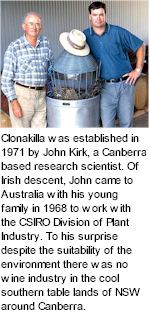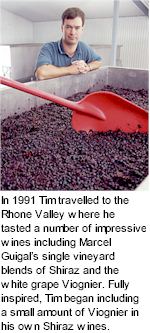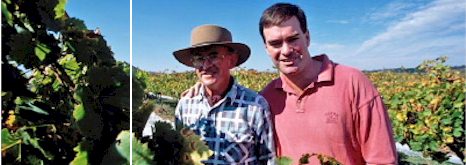About Clonakilla - the Winery
Clonakilla
Clonakilla is a small, family winery dedicated to making distinctive, handcrafted wines, they can be hard to find but are worth the search
Clonakilla was established in 1971 by John Kirk, a Canberra based research scientist. Of Irish descent, John came to Australia with his young family in 1968 to work with the CSIRO Division of Plant Industry. To his surprise despite the suitability of the environment there was no wine industry in the cool southern table lands of NSW around Canberra. To remedy this situation, in 1971 he bought a 44 acre farm near the village of Murrumbateman in New South Wales, 40 kilometres north of Canberra. The soil consisted of sandy clay loams over a friable clay subsoil and, with a climate not dissimilar to the Bordeaux region and Northern Rhone valley in France, he held high hopes for its wine producing potential.

He proceeded to plant 1.2 acres each of Cabernet Sauvignon and Riesling. He named the property Clonakilla (‘meadow of the church’) after his grandfather’s farm in County Clare. A further 1.2 acres of Shiraz, Chardonnay and Pinot Noir were planted in 1972 and the vines grew well, although some were lost in a drought in 1972-73. John persevered and produced the Canberra District’s first commercial vintage in 1976: a Riesling and a Cabernet Shiraz. It wasn’t until 1978 when a bore was sunk that larger plantings became feasible. From 1978 to the present the vineyard was gradually expanded with Shiraz, Viognier, Riesling and the Cabernet family, now making up the bulk of the vineyard.
At the end of 1996 John’s fourth son Tim left a career in school teaching to work full time in the family business as winemaker and general manager. In 1998 Tim and his wife Lara bought the 50 acre property next door and planted Shiraz and Viognier as well as a small olive grove on the warm north-east facing slope. Between the two properties there are now twenty two acres under vine with further plantings planned for the future.
Through the seventies and eighties the Cabernet and Shiraz were blended together in traditional Australian style. With the 1990 vintage Clonakilla decided to bottle the wines separately. The first Shiraz went on to win two gold, one silver and two trophies in only three showings. It was at this point that Clonakilla began to see the potential of Shiraz in the Canberra District.

In 1991 Tim travelled to the Rhone Valley in France. There he tasted a number of impressive Shiraz wines including Marcel Guigal’s single vineyard blends of Shiraz and the rare white grape Viognier. Inspired by those wines Tim began including a small amount of Viognier in his own Shiraz as of 1992. The Viognier component now accounts for between five and ten percent and adds an intriguing floral dimension to the wine.
Clonakilla also started incorporating other winemaking approaches that were unashamedly borrowed from Rhone valley and Burgundian winemakers: inclusion of whole bunches in the ferments, pre-ferment maceration and French oak barrel maturation. More importantly he worked harder in the vineyard to open up the vine leaf canopies, limit yields and produce grapes with riper flavour profiles. The work began to yield some impressive results, with gold medals, trophies and numerous five-star reviews following in succession. It is this wine, the Shiraz Viognier, that has cemented Clonakilla's reputation as one of Australia’s top small wineries, having been named NSW Wine of the Year in 1999, Penguin Wine of the Year in 2002 and one of Australia’s top ten Shiraz (Gourmet Traveller Wine). It is ranked Outstanding in the prestigious Langton’s Classification of Australian Wine. It is one of only five Shiraz to receive a perfect rating in Jeremy Oliver’s Australian Wine Annual.
In 1998 Clonakilla began producing a straight Viognier, now seen as an Australian benchmark for the style. The Riesling and the Hilltops Shiraz are rising stars. The newly named Ballinderry, a Cabernet Sauvignon/Cabernet Franc/Merlot blend, made from some of the oldest vines on the property, is now also drawing critical acclaim. Clonakilla currently produce around 9000 cases of wine per year and you will find them at many of the best restaurants in the United Kingdom, Singapore and Hong Kong.
